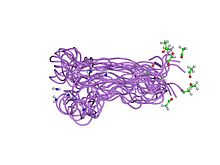In molecular biology, the CFC domain (Cripto_Frl-1_Cryptic domain) is a protein domain found at the C-terminus of a number of proteins including Cripto (or teratocarcinoma-derived growth factor).[1][2] It is structurally similar to the C-terminal extracellular portions of Jagged 1 and Jagged 2.[1] CFC is approx 40-residues long, compacted by three internal disulphide bridges, and binds Alk4 via a hydrophobic patch. CFC is structurally homologous to the VWFC-like domain.[1]
| CFC | |||||||||
|---|---|---|---|---|---|---|---|---|---|
 nmr analysis of mouse cripto cfc domain | |||||||||
| Identifiers | |||||||||
| Symbol | CFC | ||||||||
| Pfam | PF09443 | ||||||||
| InterPro | IPR019011 | ||||||||
| |||||||||
The CFC domain appears to play a crucial role in the tumourigenic activity of Cripto proteins, as it is through the CFC domain that Cripto interferes with the onco-suppressive activity of Activins, either by blocking the Activin receptor ALK4 or by antagonising proteins of the TGF-beta family.[3]
References
edit- ^ a b c Foley SF, van Vlijmen HW, Boynton RE, Adkins HB, Cheung AE, Singh J, Sanicola M, Young CN, Wen D (September 2003). "The CRIPTO/FRL-1/CRYPTIC (CFC) domain of human Cripto. Functional and structural insights through disulfide structure analysis". Eur. J. Biochem. 270 (17): 3610–8. doi:10.1046/j.1432-1033.2003.03749.x. PMID 12919325.
- ^ Calvanese L, Saporito A, Marasco D, D'Auria G, Minchiotti G, Pedone C, Paolillo L, Falcigno L, Ruvo M (November 2006). "Solution structure of mouse Cripto CFC domain and its inactive variant Trp107Ala". J. Med. Chem. 49 (24): 7054–62. doi:10.1021/jm060772r. PMID 17125258.
- ^ Calvanese L, Saporito A, Oliva R, D' Auria G, Pedone C, Paolillo L, Ruvo M, Marasco D, Falcigno L (March 2009). "Structural insights into the interaction between the Cripto CFC domain and the ALK4 receptor". J. Pept. Sci. 15 (3): 175–83. doi:10.1002/psc.1091. PMID 19035567.